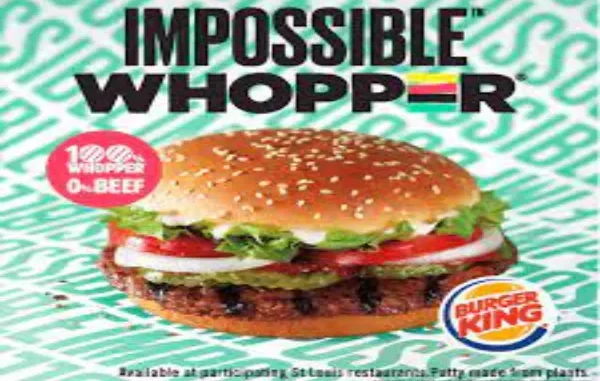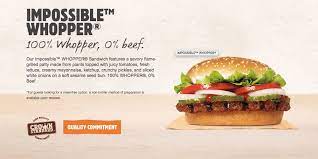
Introduction
In recent years, the plant-based food movement has gained tremendous momentum, driven by a growing awareness of environmental concerns, animal welfare, and health-conscious dietary choices. One of the most notable entries into the market has been the Impossible Whopper, a meatless burger offered by Burger King.
While the Impossible Whopper has garnered a dedicated following, it has also become the subject of a lawsuit, raising questions about labeling, consumer expectations, and the future of plant-based meat alternatives. In this article, we explore the details of the Impossible Whopper lawsuit, its implications, and the broader context of the plant-based food industry.
The Rise of the Impossible Whopper

The Impossible Whopper, introduced in August 2019, is a plant-based burger created by Impossible Foods. It was a groundbreaking development in the fast-food industry, as it aimed to provide a meatless alternative that closely mimics the taste and texture of traditional beef burgers. The burger’s main ingredient is heme, a molecule found in plants and animals that gives meat its distinctive flavor.
The introduction of the Impossible Whopper was met with excitement by vegans, vegetarians, and flexitarians looking for meatless options. It also signaled a shift in the fast-food landscape, with other major chains exploring plant-based offerings.
The Lawsuit Against Burger King
In November 2019, a lawsuit was filed against Burger King by a vegan customer named Phillip Williams. Williams alleged that he had purchased an Impossible Whopper under the impression that it was entirely vegan, only to later discover that the burger was cooked on the same grill as meat products, potentially exposing it to cross-contamination.

Williams claimed that he wouldn’t have purchased the burger had he known about the possibility of cross-contact with animal products. He argued that Burger King engaged in false advertising and deceptive trade practices by failing to disclose the cooking method.
The Legal Arguments
The lawsuit against Burger King raised several legal questions, including:
- False Advertising: The primary argument centered on whether Burger King’s marketing of the Impossible Whopper as “100% Whopper, 0% Beef” constituted false advertising, given the potential for cross-contamination during cooking.
- Consumer Expectations: The case also touched on the concept of consumer expectations. Should consumers reasonably expect a plant-based burger to be cooked separately from meat products?
- Transparency and Labeling: The lawsuit underscored the importance of clear labeling and transparency in the marketing of plant-based products.
Settlement and Implications

In August 2020, Burger King and the plaintiff reached a settlement, which led to the dismissal of the lawsuit. The terms of the settlement were not disclosed, but it highlighted the significance of addressing consumer concerns and ensuring transparency in the marketing of plant-based products.
The Impossible Whopper lawsuit brought attention to the need for clear labeling and communication in the plant-based food industry. It also spurred discussions about the challenges of cross-contamination in restaurants that serve both plant-based and animal-based products.
The Broader Context
The Impossible Whopper lawsuit is just one example of the legal challenges that have arisen in the plant-based food industry. As the popularity of plant-based products continues to grow, there is a growing need for clear standards, regulations, and labeling practices to protect consumers and prevent misunderstandings.

The case also highlights the broader debate surrounding the definition of terms like “vegan” and “vegetarian” in the context of food labeling and marketing. Should these terms imply not only the absence of animal-derived ingredients but also the absence of cross-contamination during preparation?
Conclusion: The Impossible Whopper Lawsuit
The Impossible Whopper lawsuit served as a reminder that the plant-based food industry is evolving and faces its share of legal challenges. It underscores the importance of transparency, clear labeling, and consumer education in ensuring that plant-based products meet the expectations of consumers.
As the industry continues to expand, it is likely that we will see further discussions and potentially more legal cases aimed at defining standards and best practices for labeling and marketing plant-based foods. These developments will play a crucial role in shaping the future of the plant-based food market and its relationship with consumers.






Leave a Reply